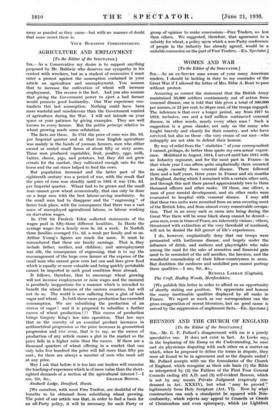AGRICULTURE AND EMPLOYMENT
[To the Editor of the SPECTATOR.] Sia,—As a Conservative my desire is to support anything proposed by Mr. Baldwin who deserves our sympathy in his contest with wreckers, but as a student of economics I must enter a protest against the assumption contained in your article on agriculture and unemployment. You assume that to increase the cultivation of wheat will increase employment The reverse is the fact. And you also assume that giving the Government power to eject a bad farmer would promote good husbandry. Our War experience con- tradicts this last assumption. Nothing could have been more wasteful and mischievous than the Government control of agriculture during the War. I will not intrude on your space or your patience by giving examples. They are well known to every farmer. But the petitio principi relative to wheat growing needs some refutation.
The facts are these. In 1761 the price of corn was 26s. 9d. per Imperial quarter and at that time English agriculture was mainly in the hands of yeoman farmers, men who either owned or rented small farms of about fifty or sixty acres. These men produced vegetables, fruit, poultry, eggs, milk, butter, cheese, pigs, and potatoes, but they did not grow cereals for the market, they cultivated enough oats for the horse and the oat straw helped to feed the cows.
But population increased and the latter part of the eighteenth century was a period of war, with the result that the price of corn rose steadily until in 1801 it was 119s. 6d. per Imperial quarter. Wheat had to be grown and the small man cannot grow wheat economically, that can only be done on a large area with the best labour-saving machinery. So the small men had to disappear and the " engrossing " of farms took place, with the consequence that there was a vast mass of unemployed agricultural labour, or labour working on starvation wages.
In 1796 Sir Frederic Eden collected statements of the wages paid in fifty-three different localities. In Hants the average wages for a family were 9s. 3d. a week. In Norfolk three families averaged 1 ls. 3d. a week per family and so on. Arthur Young's figures are much the same. It must be remembered that these are family earnings. That is, they include father, mother, and children ; and unemployment was rife, the consequence of engrossing, that is to say the encouragement of the large corn farmer at the expense of the small man who cannot grow corn but can and does grow food which is equally or more valuable and being quickly perishable cannot be imported in such good condition from abroad.
It follows, therefore, that to encourage wheat growing will not increase employment or raise wages and the moment is peculiarly inopportune for a measure which is intended to benefit the wheat farmers of the eastern counties, but will not do so. The world is now suffering from a glut of both sugar and wheat. In both these cases production has exceeded consumption. We are subsidising the production of an excess of sugar ! and it is proposed to subsidize a further excess of wheat production ! ! ! This excess of production brings Gregory King's law into operation. That law says that as the scarcity of an essential product increases in arithmetrical progression so the price increases in geometrical progression and vice versa, that is to say, as the excess of production of any article causes a glut in the market so the price falls in a higher ratio than the excess. If there are a thousand quarters of wheat offering in a market that can only take five hundred the price will fall more than fifty per cent., for there are always a number of men who must sell at any price.
May I ask that before it is too late our leaders will examine the teaching of experience which is of more value than the short- sighted demands of a section of the agricultural interest ?—I am, Sir, &c., GRAHAM BOWER. Stuchvell Lodge, Droxford, Hants.
[We ourselves, with most Free Traders,. are doubtful of the benefits to be obtained from subsidizing wheat growing. The point of our article was that, in order to find a basis for an all-Party policy, it will be necessary for each Party or
group Of opinion to make aoncessionsFree Traders, no less than others. We suggested, theiefore, that -agreement to -a subsidy for wheat, a policy upon which a non--Party conference of people in the industry has already agreed; would be a suitable concession on the part of Free Traders:—En. Spectator.]








































 Previous page
Previous page